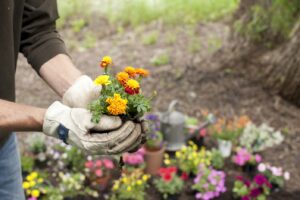
Here are some tips for preparing your garden beds for winter.
Thanksgiving is over, and we are officially in winter! Preparing your garden for the winter months becomes essential as the season progresses. Proper winterization ensures that vegetable plots, annuals, and perennials remain healthy and ready to thrive when spring arrives. The last thing you want is to find that your garden beds have frozen solid. Here are some tips for preparing your garden beds for winter.
Harvest and Clean Garden Beds
Before the first frost, harvest any remaining vegetables from your garden. This step provides fresh produce and prevents pests and diseases from overwintering in leftover crops.
After harvesting, remove dead or dying vegetation from garden beds. Clearing out spent plants reduces the risk of diseases and pests that could harm next season’s growth. Healthy plant material can be composted, but diseased plants should be discarded to avoid contamination.
Thorough weeding is another critical task in garden care. Removing weeds prevents them from setting seeds and spreading, reducing your spring workload. Removal is an important preventive measure since weeds often harbor pests and diseases.
Test and Treat Your Soil
After clearing the beds, conduct a soil test to identify nutrient deficiencies or pH imbalances. This information will guide your amendments. Incorporate organic matter, such as compost or well-rotted manure, to improve soil fertility and structure while supporting beneficial microorganisms.
Applying a layer of organic mulch, like shredded leaves or straw, provides insulation, retains moisture, and suppresses weeds. Mulch also protects plant roots from extreme temperature fluctuations during the winter months.
Caring for Perennials and Annuals
Light pruning to remove dead or diseased foliage from your perennials can help prevent overwintering pests and diseases. Mulch applied around the base insulates roots and stabilizes soil temperatures. However, ensure the mulch doesn’t touch plant stems to avoid rot.
Since annuals complete their life cycle in one season, they should be removed and composted once they finish blooming. This clears space and minimizes the risk of disease.
Maintain Your Garden Tools
Remember to care for your garden tools. Thoroughly cleaning tools to remove soil and plant debris prevents rust and the spread of diseases. Sharpen blades to keep them effective, and store tools in a dry location to protect them from corrosion.
Plan Ahead for Spring
Use this time to evaluate your landscape’s performance over the past year. Note which plants thrived and which struggled to help inform your decisions for the next season—research and order seeds for spring planting. Consider any layout or structural adjustments that could improve your garden’s efficiency and productivity.
Questions? Lehnhoff’s Supply is Here to Help
If you still have more questions about winterizing your garden beds, the trained professionals at Lehnhoff’s Supply are here to help you.
Find us at 2708 Belair Road, Fallston, MD 21047 and give us a call at 410-510-7646. For tips, tricks, and to see what we have been up to, be sure to follow us on Facebook, X – Twitter, and Pinterest!
We serve but aren’t limited to, the following parts of Maryland: Harford County – Fallston, Forest Hill, Joppa, Edgewood, Bel Air, Churchville, Havre de Grace, Jarrettsville, Street, Aberdeen, Abingdon, and Joppatowne. In Baltimore County: Kingsville, Perry Hall, Overlea, Fullerton, Nottingham, Parkville, Towson, Carney, Loch Raven, Lutherville, Timonium, Hunt Valley, Cockeysville, Sparks, Glyndon, Pikesville, Reisterstown, Ruxton, Parkton, Glen Arm, Baldwin, Monkton, Long Green, White Marsh, Rosedale, Phoenix, and Fork.
